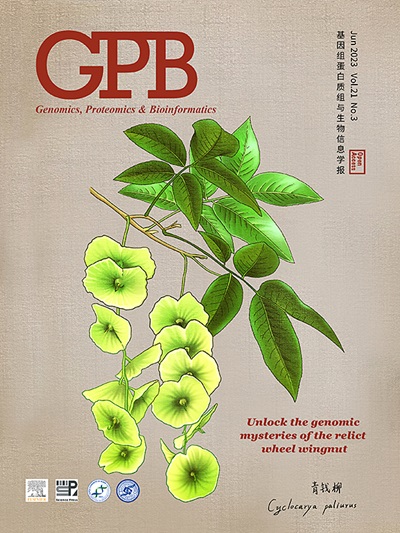Novel Time-dependent Multi-omics Integration in Sepsis-associated Liver Dysfunction
IF 7.9
2区 生物学
Q1 GENETICS & HEREDITY
引用次数: 0
Abstract
The recently developed technologies that allow the analysis of each single omics have provided an unbiased insight into ongoing disease processes. However, it remains challenging to specify the study design for the subsequent integration strategies that can associate sepsis pathophysiology and clinical outcomes. Here, we conducted a time-dependent multi-omics integration (TDMI) in a sepsis-associated liver dysfunction (SALD) model. We successfully deduced the relation of the Toll-like receptor 4 (TLR4) pathway with SALD. Although TLR4 is a critical factor in sepsis progression, it is not specified in single-omics analyses but only in the TDMI analysis. This finding indicates that the TDMI-based approach is more advantageous than single-omics analyses in terms of exploring the underlying pathophysiological mechanism of SALD. Furthermore, TDMI-based approach can be an ideal paradigm for insightful biological interpretations of multi-omics datasets that will potentially reveal novel insights into basic biology, health, and diseases, thus allowing the identification of promising candidates for therapeutic strategies.
脓毒症相关肝功能障碍中的新型时间依赖性多组学整合技术
最近开发的技术可以对每一个单一的全息图进行分析,从而提供了对正在发生的疾病过程的无偏见的洞察力。然而,为后续整合策略指定研究设计以将脓毒症病理生理学和临床结果联系起来仍具有挑战性。在这里,我们在脓毒症相关肝功能异常(SALD)模型中进行了时间依赖性多组学整合(TDMI)。我们成功地推断出了toll样受体4(TLR4)通路与SALD的关系。虽然 TLR4 是脓毒症进展的关键因素,但它在单体组学结果中并不明确,而仅在 TDMI 分析中明确。这一结果表明,在探索这种疾病的潜在病理生理机制方面,基于 TDMI 的方法比单组学分析更具优势。此外,这种方法还是对多组学数据集进行深入生物学解读的理想范例,有可能揭示基础生物学、健康和疾病方面的新见解,从而确定有希望的候选治疗策略。
本文章由计算机程序翻译,如有差异,请以英文原文为准。
求助全文
约1分钟内获得全文
求助全文
来源期刊

Genomics, Proteomics & Bioinformatics
Biochemistry, Genetics and Molecular Biology-Biochemistry
CiteScore
14.30
自引率
4.20%
发文量
844
审稿时长
61 days
期刊介绍:
Genomics, Proteomics and Bioinformatics (GPB) is the official journal of the Beijing Institute of Genomics, Chinese Academy of Sciences / China National Center for Bioinformation and Genetics Society of China. It aims to disseminate new developments in the field of omics and bioinformatics, publish high-quality discoveries quickly, and promote open access and online publication. GPB welcomes submissions in all areas of life science, biology, and biomedicine, with a focus on large data acquisition, analysis, and curation. Manuscripts covering omics and related bioinformatics topics are particularly encouraged. GPB is indexed/abstracted by PubMed/MEDLINE, PubMed Central, Scopus, BIOSIS Previews, Chemical Abstracts, CSCD, among others.
 求助内容:
求助内容: 应助结果提醒方式:
应助结果提醒方式:


